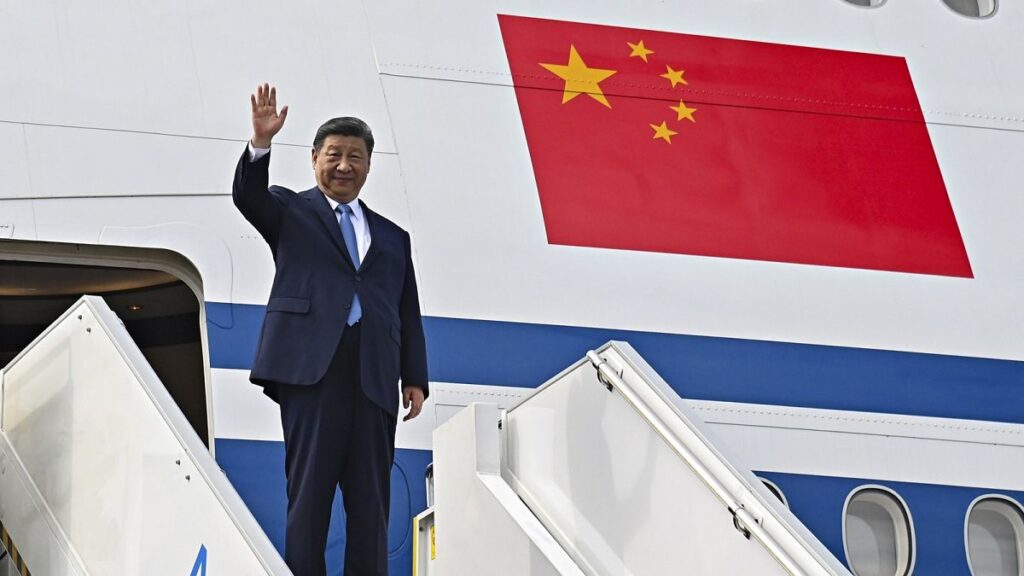The European Parliament and China are “in the final stages” of the process of removing retaliatory sanctions imposed by Beijing on a handful of lawmakers in 2021, a controversial move that prompted the collapse of a high-stakes investment deal.
The overture comes amid growing speculation of an impending reset in EU-China relations driven by the disruptive policies of Donald Trump, which have antagonised allies and adversaries alike and sent nations into a scramble for new partnerships.
“Discussions with the Chinese authorities are continuing and in their final stages,” a spokesperson from the Parliament said in a statement.
“It has always been the European Parliament’s intention to have the sanctions lifted and resume relations with China.”
The Parliament’s president, Roberta Metsola, is leading the negotiations and will inform leaders of the political groups “once the Chinese authorities officially confirm that sanctions have been lifted,” the spokesperson noted.
The Chinese Mission to the EU did not immediately reply to a request for comment.
The political dispute dates back to March 2021, when the 27 member states agreed to sanction four Chinese officials and one entity accused of committing human rights violations against the Uyghur Muslin minority in the Xinjiang region.
Beijing struck back with tit-for-tat restrictions, targeting ten European individuals, including five MEPs, and four entities.
The MEPs were specifically selected because of their work in EU-China relations and foreign interference. Michael Gahler (Germany/EPP), Raphaël Glucksmann (France/S&D), Ilhan Kyuchyuk (Bulgaria/Renew Europe) and Miriam Lexmann (Slovakia/EPP) are still in office, while Reinhard Butikofer (Germany/Greens) left the hemicycle last year.
The entities blacklisted by China included the Parliament’s Subcommittee on Human Rights and the EU Council’s Political and Security Committee (PSC).
It is not clear if the Metsola-led discussions are aimed at lifting all the sanctions in place or only those against sitting MEPs.
A contentious deal
The fact that Beijing went after democratically elected lawmakers was met with a furious response in Brussels and across the bloc. A few months after the retaliation, the Parliament overwhelmingly voted to freeze the ratification of the comprehensive investment agreement (CAI) that the EU and China had announced in late 2020.
The agreement, concluded only in principle, was meant to open market access for EU investors and ensure fairer treatment for EU companies that operate in China. The text was based on commitments to alleviate long-standing friction points about state-owned companies, industrial subsidies and the forced transfer of technology.
While initially hailed as a landmark, the agreement was quickly criticised for what critics said were insufficient provisions regarding labour rights. International organisations and media outlets have detailed a policy of forced labour and political indoctrination inside the mass detention camps in Xinjiang. The facilities have also been plagued by accusations of torture, disappearance, forced sterilisation and sexual violence.
Following the 2021 dispute, the CAI was abandoned by Brussels and never brought back to the table, despite Beijing’s repeated attempts to revive the text.
Since the signature, market access in China has become increasingly restrictive to foreign companies due to stringent regulations, government pressure and geopolitical tensions, precipitating a plunge in investment flows and business confidence.
Asked if the diplomatic overture could justify rescuing the deal, the European Commission avoided speculation. “We’ll cross that bridge when we’re that far,” a Commission spokesperson said on Thursday.
Faced with Trump’s punitive tariffs, Brussels has stepped up its engagement with other countries around the globe, such as Canada, Norway, Iceland, New Zealand and the United Arab Emirates, to shore up alternative commercial routes for EU exporters.
Earlier this month, Ursula von der Leyen held a phone call with Chinese Premier Li Qiang, fuelling talk of a reset after years of confrontation. The read-out released by Li’s office was notably optimistic, highlighting a “momentum of steady growth” in bilateral ties.
The Commission has since tried to temper the enthusiasm, pointing to Beijing’s continued support for Moscow and the risk of having the EU market flooded with cheap goods that China can no longer sell to America due to the prohibitively high tariffs.
The optics of an EU-China rapprochement could derail the hopes of reaching a compromise with the Trump administration, which pursues a hard line on Beijing. Brussels, however, has also made it clear that the bloc would not seek to decouple from the Chinese economy as a condition for winning a reprieve from Trump’s tariffs.
Read the full article here
